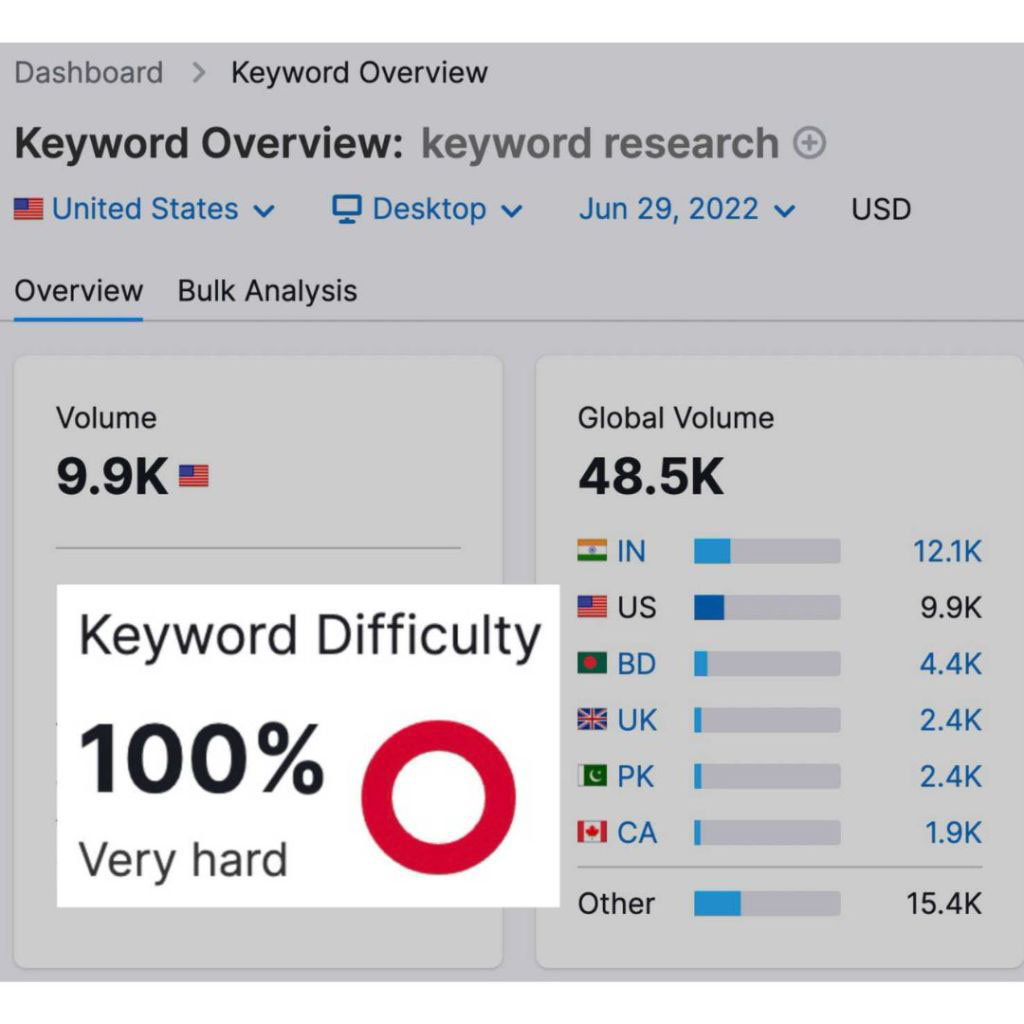Learn Search Engine Optimization (SEO) if you want your business to appear online. This is because digital marketing is constantly changing. The meticulous keyword analysis process is at the heart of a successful SEO strategy. This guide will delve into the significance of SEO keyword analysis , its intricacies, and how it serves as a linchpin for enhancing website rankings.
Decoding SEO Keyword Analysis
An effective SEO campaign’s foundation is its research of SEO keywords. It entails researching and determining the keywords and search terms prospective clients use to look for goods, services, or details about a specific company. Businesses can raise their chances of showing up higher on search engine results pages (SERPs) by strategically using these keywords in the content of their websites.
The Steps to Effective SEO Keyword Analysis
Research and Brainstorming:
- Start by creating a list of possible terms related to your business.
- Find essential and high-ranking keywords with tools like Google Keyword Planner, SEMrush, or Ahrefs.
Competitor Analysis:
- Analyze competitors in your industry to identify keywords driving traffic to their sites.
- Look for gaps and opportunities in their strategies to refine your approach.
Long-Tail Keywords:
- Don’t overlook the power of long-tail keywords – more specific phrases with lower search volume can attract highly targeted traffic.
User Intent:
- Understand the intent behind the keywords. Are users looking for information, making a purchase, or seeking reviews?
- Make sure your material fits the user’s purpose to get them more involved and get them to buy.

Implementing SEO Keyword Analysis for Success
Once you’ve compiled a robust list of keywords, the next step is implementing them strategically across your website:
On-Page Optimization:
- Incorporate keywords naturally into your page titles, meta descriptions, headers, and content.
- Ensure a seamless user experience while integrating keywords.
Quality Content:
- Create high-quality, relevant content around your chosen keywords.
- Search engines give more weight to material that is useful to users.
Mobile Optimization:
- Mobile devices are becoming more popular, so ensure your website works well on phones for better results.
Link Building:
- Build authoritative backlinks to your site, as search engines view these as a vote of confidence in your content.
The Importance of Local SEO in Keyword Analysis
For businesses that have physical locations or focus on specific areas, local SEO is essential for appearing in local search results.
Key Points:
- Local Keyword Research: Use terms that include your city or region.
- Google My Business: Optimize your profile for better local visibility.
- Local Citations: List your business on local directories.
- User Reviews: Encourage positive reviews to boost local rankings.
Leveraging Content Marketing for Enhanced Keyword Integration
Content marketing integrates keywords naturally, improving rankings and engaging your audience.
Key Points:
- Content Types: Create blogs, infographics, videos, and more.
- Editorial Calendar: Plan consistent, keyword-rich content.
- Evergreen Content: Produce content that remains relevant over time.
- Content Optimization: Update existing content with new keywords.
The Impact of SEO Keyword Analysis on Ranking
Practical SEO keyword analysis isn’t just about integrating keywords; it’s about understanding your audience and aligning your content with their needs. The impact is profound, leading to:
Improved Visibility:
- Website exposure increases when relevant keyword optimization makes them more likely to appear on the first page of search results.
Targeted Traffic:
- You generate more targeted and potentially converting traffic by attracting users actively searching for specific products or information.
Higher Conversion Rates:
- Tailoring content to user intent can increase conversion rates, as your website aligns with what users seek.

Navigating SEO Tools for Keyword Analysis
Using cutting-edge SEO tools , embarking on SEO keyword analysis is made significantly more efficient and insightful. Explore the world of analytics with tools such as Google Analytics, Moz, or Ubersuggest. These tools not only aid in identifying high-performing keywords but also provide valuable data on user behavior, helping you refine your content strategy for maximum impact.
Overcoming Challenges in SEO Keyword Analysis
While SEO keyword analysis is a potent tool, it comes with challenges. From evolving search engine algorithms to the dynamic nature of user search behavior, staying ahead requires adaptability. This section will address common challenges faced in keyword analysis and provide actionable insights on overcoming them. Understanding and navigating these challenges can fortify your SEO strategy and ensure sustained success in the ever-changing digital landscape.
FAQ’s
1. What is SEO keyword analysis, and why is it essential for online businesses?
SEO keyword analysis aims to find and select keywords that people will likely use when looking for products or services online. It is essential for online businesses because it helps optimize website content , which makes it easier for search engines to find and more likely to bring in focused traffic.
2. How do I conduct practical SEO keyword analysis for my website?
To conduct practical SEO keyword analysis:
- First, write down your business’s goals and who you want to reach.
- SEMrush and Google Keyword Planner are two tools that might assist you in locating key terms.
- Focus on long-tail keywords, assess competition, and consider user intent.
- Regularly update your keyword strategy to adapt to changing trends and search engine algorithms.

3. What role do long-tail keywords play in SEO keyword analysis?
Long-tail keywords are specific and longer phrases that users are likely to enter in search queries. They play a crucial role in SEO keyword analysis by targeting a more niche audience, reducing competition, and improving the chances of ranking higher in search engine results. Incorporating long-tail keywords into your content helps attract more qualified and targeted traffic.
4. Is SEO keyword analysis a one-time task, or should it be an ongoing process?
SEO keyword analysis is not a one-time task; it should be an ongoing process. The online landscape, search trends, and user behavior evolve. Regularly update your keyword strategy to stay relevant, adapt to changes in your industry, and ensure your website remains optimized for search engines.
5. How can I tell if my SEO keyword research is working?
Key performance indicators (KPIs) like organic traffic, keyword rankings, and conversion rates can help you determine how well your SEO keyword research works. Use web analytics tools, such as Google Analytics, to monitor how specific keywords are doing and decide how your SEO tactics affect your business goals and website traffic.

SEO keyword analysis is not a one-size-fits-all solution but a dynamic process that evolves with changes in user behavior and search engine algorithms. Mastering this art is crucial for businesses aspiring to stay ahead in the digital realm. As you start your SEO journey, remember that elatre.com has a lot of information to help you learn and use SEO techniques better.
Ready to elevate your online presence? Explore the in-depth resources and tools available at elatre.com to supercharge your SEO efforts and propel your business to new heights.



